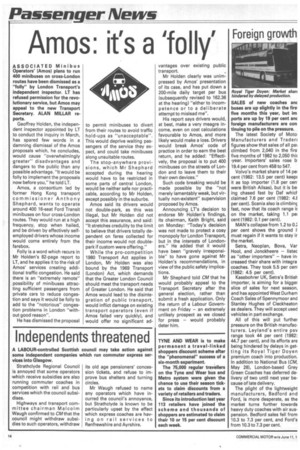Amos: it's a 'folly
Page 16

If you've noticed an error in this article please click here to report it so we can fix it.
ASSOCIATED Minibus Operators' (Amos) plans to run 400 minibuses on cross-London routes have been dismissed as a "folly" by London Transport's independent inspector. IT has refused permission for the revolutionary service, but Amos may appeal to the new Transport Secretary. ALAN MILLAR repods.
Geoffrey Holden, the independent inspector appointed by LT to conduct the inquiry in March, has spared few words in a damning dismissal of the Amos proposals which, he concludes, would cause "overwhelmingly greater" disadvantages and dangers to the public than any possible advantage. "It would be folly to implement the proposals now before you," he told LT.
Amos, a consortium led by former Hong Kong transport commissioner Anthony Shepherd, wants to operate around 400 16-seat Ford Transit minibuses on four cross-London routes. They would run at a high frequency, stop when hailed, and be driven by effectively selfemployed drivers whose income would come entirely from the farebox.
Folly is a word which recurs in Mr Holden's 82-page report to LT, and he applies it to the risk of Amos' services creating additional traffic congestion. He said there is an "extremely remote" possibility of minibuses attracting sufficient passengers from private cars to reduce congestion and says it would be folly to add to the "notorious" congestion problems in London "without good reason".
He has dismissed the proposal to permit minibuses to divert from their routes to avoid traffic hold-ups as "unacceptable". This would deprive waiting passengers of the service they expect, and could take minibuses along unsuitable routes.
The stop-anywhere provisions, which Mr Shephard accepted during the hearing would have to be restricted in some parts of central London, would be neither safe nor practicable, according to Mr Holden, except possibly in the suburbs.
Amos said its drivers would not double-park, as this was illegal, but Mr Holden did not accept this assurance, and said: "It stretches credulity to the limit to believe that drivers totally dependent on fares collected for their income would not doublepark if custom were offering."
While the pro-competition 1980 Transport Act applies in London, Mr Holden was also bound by the 1969 Transport (London) Act, which demands that the Greater London Council should meet the transport needs of Greater London. He said that Amos would lead to the disintegration of public transport, would inflict damage on existing transport operators (even if Amos failed very quickly), and would offer no significant ad vantages over existing public transport.
Mr Holden clearly was unimpressed by Amos' presentation of its case, and has put down a 200-mile daily target per bus (subsequently revised to 162.36 at the hearing) "either to incompetence or to a deliberate attempt to mislead me".
His report says drivers would, at best, make a very meagre income, even on cost calculations favourable to Amos, and more likely would make a loss. Drivers would break Amos' code of practice in order to earn the best return, and he added: "Effectively, the proposal is to put 400 minibuses on the streets of London and to leave them to their their own devices."
Such code breaking would be made possible by the "not merely lamentably weak, but virtually non-existent" supervision proposed by Amos.
Announcing LT's decision to endorse Mr Holden's findings, its chairman, Keith Bright, said on Monday: "Today's decision was not made to protect a cosy monopoly for London Transport, but in the interests of Londoners." He added that it would have been "gravely irresponsible" to have gone against Mr Holden's recommendations, in view of the public safety implications.
Mr Shephard told CM that he would probably appeal to the Transport Secretary after the general election, rather than submit a fresh application. Only the return of a Labour Government on Friday — an extremely unlikely prospect as we closed for press — would probably deter him. SALES of new coaches anc buses are up slightly in the firsi five months this year, but im. ports are up by 19 per cent anc foreign manufacturers are con tinuing to pile on the pressure.
The latest Society of Moto' Manufacturers and Trader figures show that sales of all ps% climbed from 2,040 in the firs. five months of 1982 to 2,050 thi ,year. Importers' sales rose ty 19.4 per cent from 458 to 547.
Volvo's market share of 14 pel cent (1982: 13.5 per cent) keep; it as top importer (1.8 per cen. were British Ailsas), but it is be ing chased fast by Daf whiclclaimed 7.6 per cent (1982: 4.E per cent). Scania also is climbinE fast, now that its coach range on the market, taking 1.1 pei cent (1982: 0.1 per cent).
MAN's collapse from 1.2 to 0.; per cent shows the ground i• must regain if it wants to stay ir the market.
Setra, Neoplan, Bova, Var Hool, and Jonckheere — listec as "other importers" — have in creased their share with integra coaches. They took 5.5 per ceni (1982: 4.5 per cent).
Kassbohrer UK, Setra's British importer, is aiming for a bigger slice of sales for next season, and has appointed West Durham Coach Sales of Spennymoor and Stanley Hughes of Cleckheaton as dealers. They will accept used vehicles in part exchange.
All of this will put further pressure on the British manufacturers. Leyland's entire psv range took 44 per cent (1982: 44.7 per cent), and its efforts are being hindered by delays in getting its Royal Tiger Doyen premium coach into production. In addition to National Bus (CM, May 28), London-based Grey Green Coaches has deferred delivery of two until next year because of late delivery.
The plight of the lightweight manufacturers, Bedford and Ford, is more desperate, as the market turns further towards heavy duty coaches with air suspension. Bedford sales fell from 10.3 to 7.3 per cent, and Ford's from 10.3 to 7.3 per cent.
































































































